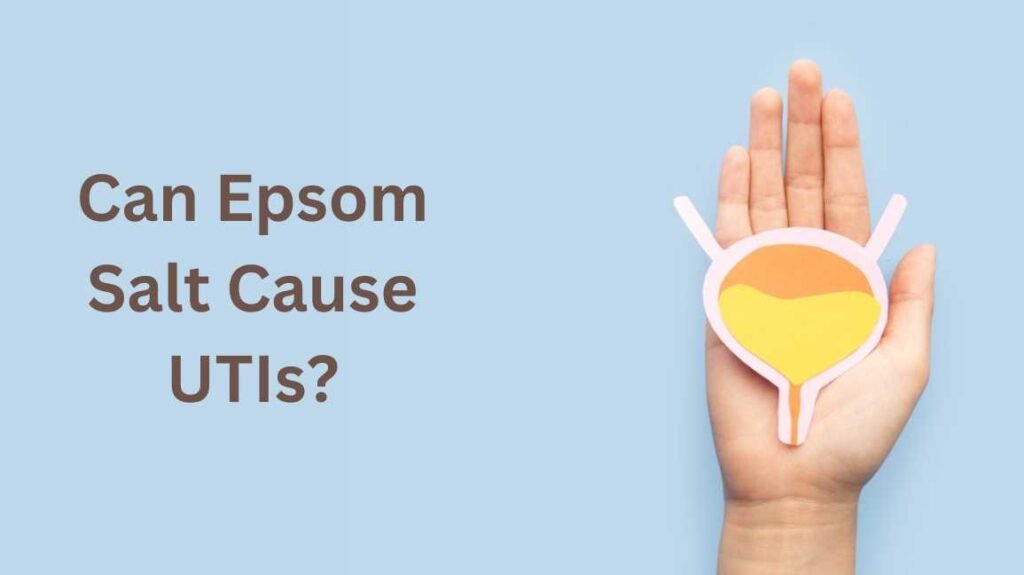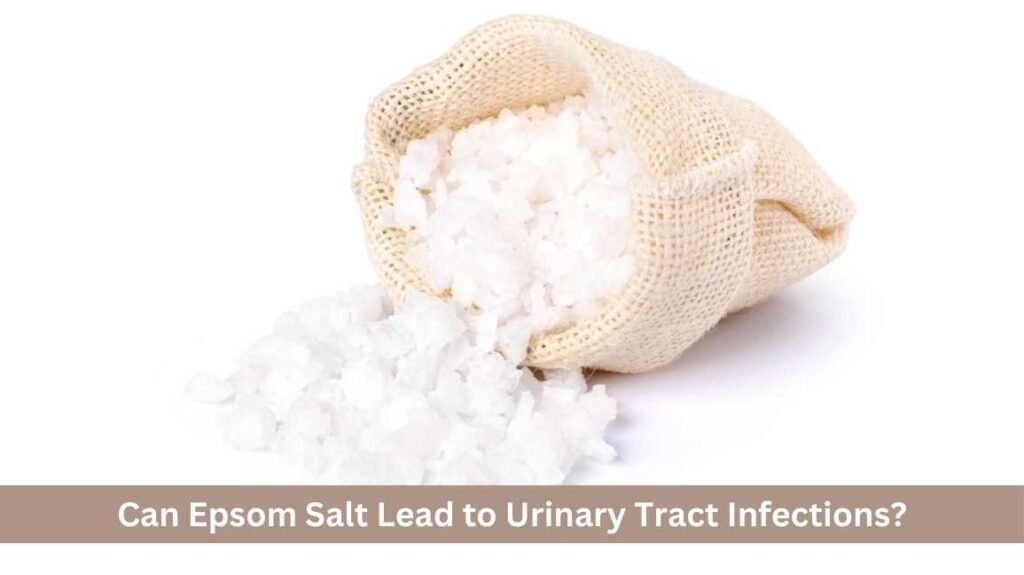Can Epsom Salt Cause UTIs? Discover the Truth

Epsom salt is a popular home remedy for relieving muscle aches and pains, soothing skin irritations, and even treating constipation.
However, there have been concerns about whether Epsom salt can cause urinary tract infections (UTIs). In this article, we’ll explore the relationship between Epsom salt and UTIs.
What are Urinary Tract Infections (UTIs)?
Before we dive into the potential connection between Epsom salt and UTIs, let’s first understand what UTIs are. UTIs are infections that can affect any part of the urinary system, including the kidneys, bladder, ureters, and urethra.
These infections are usually caused by bacteria entering the urinary tract through the urethra and multiplying in the bladder. These are most common in women, but anyone can develop a UTI.
Symptoms of UTIs
Some common symptoms of UTIs include:
- Burning or pain during urination
- Frequent urge to urinate
- Passing small amounts of urine frequently
- Cloudy urine or urine with a strong odor
- Pelvic pain in women
If not treated, UTIs can result in more severe issues like kidney infections.
Can Epsom Salt Lead to Urinary Tract Infections?

Now, let’s address the question on everyone’s mind – can Epsom salt cause UTIs? The short answer is no.
Epsom salt is primarily composed of magnesium and sulfate, which are known for their anti-inflammatory and pain-relieving properties. When dissolved in water, it is believed to help ease muscle tension and promote relaxation.
There is no evidence to suggest that Epsom salt can cause UTIs. In fact, some studies have shown that soaking in an Epsom salt bath may actually decrease the risk of developing a UTI by helping to balance the pH levels in the urinary tract.
However, it is essential to note that using Epsom salt baths as a home remedy for UTIs is not recommended. If you suspect you have a UTI, it is crucial to seek medical treatment from a healthcare professional. Home remedies may offer temporary relief but do not treat the underlying infection.
Also Read: Can Epsom Salt Cause Yeast Infections?
Factors to Consider
While Epsom salt may not directly cause UTIs, there are a few factors that could increase your risk of developing one after using Epsom salt baths:
- Baths and hot tubs, in general, can introduce bacteria to the urinary tract if they are not cleaned properly.
- Using scented products or bubble baths along with Epsom salt may irritate the urethra and increase the risk of infection. It is best to stick to plain Epsom salt without any added fragrances or chemicals.
- Soaking in an Epsom salt bath for too long can dehydrate the body, which may contribute to the growth of bacteria in the urinary tract.
Other Causes of UTIs
Some other common causes of UTIs include:
Sexual Activity: Increased sexual activity, especially with new or multiple partners, can introduce bacteria into the urinary tract.
Certain Birth Control Methods: Using diaphragms or spermicide can increase the risk of developing UTIs.
Menopause: Reduced estrogen levels during menopause can lead to changes in the urinary tract, making it more susceptible to infections.
Urinary Tract Abnormalities: Structural abnormalities or blockages in the urinary tract can prevent urine from being expelled properly, allowing bacteria to grow.
Suppressed Immune System: Conditions like diabetes or medications that suppress the immune system can make it easier for infections to take hold.
Catheter Use: Using a urinary catheter increases the risk of bacteria entering the urinary tract, leading to infection.
Poor Hygiene: Inadequate or incorrect personal hygiene practices can introduce bacteria into the urinary tract.
Understanding these factors can help in taking preventive measures to reduce the risk of developing UTIs.
Alternatives to Epsom Salt Baths
If you’re seeking alternatives to Epsom salt baths for relaxation or relief from muscle aches, consider the following options:
1. Warm Water Soaks: Simply soaking in warm water can help relax the muscles and soothe discomfort without the need for any additives.
2. Herbal Baths: Adding herbal teas or infusions such as chamomile, lavender, or calendula to your bathwater can provide soothing effects and promote relaxation.
3. Baking Soda Baths: Baking soda can help to soothe irritated skin and has mild antiseptic properties, making it a good alternative for those prone to infections.
4. Oatmeal Baths: Colloidal oatmeal is known for its skin-soothing properties and can help alleviate itching and irritation.
5. Essential Oils: Adding a few drops of essential oils like eucalyptus, peppermint, or lavender to your bath can enhance relaxation and provide some relief from muscle tension. Be sure to dilute the oils properly and use them sparingly.
6. Magnesium Oil Spray: Spraying magnesium oil directly onto the skin can help with muscle soreness and relaxation without the need for a bath.
7. Hydration and Stretching: Staying well-hydrated and incorporating stretching exercises into your routine can prevent muscle cramps and promote overall wellness.
By exploring these alternatives, you can find a method that suits your needs and preferences while minimizing the risk of UTIs.
Tips to Minimize the Risk of UTIs
Here are some effective tips to prevent UTIs:
1. Stay Hydrated: Consume ample water during the day to help flush bacteria from the urinary tract.
2. Maintain Good Hygiene: Practice proper personal hygiene by wiping front to back after using the restroom to prevent bacteria from spreading.
3. Urinate Frequently: Avoid holding your urine for extended periods. Regularly empty your bladder to prevent bacterial growth.
4. Post-Sexual Activity Hygiene: Urinate shortly after sexual activity to help clear any bacteria introduced during intercourse.
5. Wear Breathable Underwear: Opt for cotton underwear and avoid tight-fitting clothing to prevent moisture buildup, which can promote bacterial growth.
6. Avoid Irritating Products: Steer clear of scented feminine products, douches, and strong soaps that can irritate the urethra.
7. Change Birth Control Methods: If prone to UTIs, consider switching from diaphragms or spermicides to other forms of birth control.
Following these measures can go a long way in reducing the risk of developing UTIs and maintaining overall urinary tract health.
Conclusion
In conclusion, Epsom salt baths may not directly cause UTIs, but there are factors to consider that can increase the risk of developing one after using them. It is always best to seek medical treatment for UTIs and avoid relying on home remedies.
However, if you do choose to use Epsom salt baths, be sure to take precautions such as keeping the bath clean and avoiding scented products. Exploring alternative methods for relaxation and muscle relief can also help minimize the risk of UTIs.
FAQs
Can men get urinary tract infections (UTIs)?
Yes, men can get urinary tract infections (UTIs). Although UTIs are more common in women due to their shorter urethra, men can still experience these infections.
Are UTIs always caused by bacteria?
No, while the majority of UTIs are caused by bacteria, specifically the bacterium Escherichia coli (E. coli), they can also be caused by fungi or viruses. However, bacterial infections are by far the most common.
Is Epsom salt safe for everyone?
In general, Epsom salt is considered safe for most people when used in moderation. However, individuals with certain health conditions, such as kidney problems, heart issues, or diabetes, should consult with a healthcare provider before using Epsom salt baths.
How often should I take an Epsom salt bath?
The frequency of taking Epsom salt baths can vary based on individual needs and health conditions. For general use, it is typically safe to take Epsom salt baths 2-3 times a week to help soothe muscles and relax.
Useful Resources
Healthline- Epsom Salt
WebMD- Urinary Tract Infections (UTIs)
Urology Care- Urinary Tract Infections in Adults
Disclaimer
This article is intended for informational purposes solely and should not replace professional medical advice, diagnosis, or treatment. Always consult a healthcare professional and never disregard or delay seeking advice based on the content you read here. While we aim to provide accurate and reliable information, we cannot guarantee its completeness, accuracy, reliability, suitability, or availability for any purpose. Use this information at your own risk. We are not responsible for any losses or damages arising from the use of our content.
READ MORE ARTICLES






